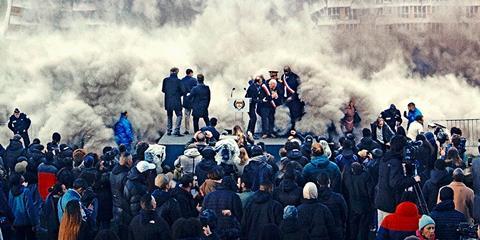A wealthy mayor takes on a Parisian immigrant tenement in Ladj Ly’s highly-charged follow up to ‘Les Miserables’

Dir: Ladj Ly. France. 2023. 105mins
Sorrow gives way to rage in Les Indesirables, the anguished second feature from Les Miserables director Ladj Ly. Chronicling an escalating battle between an inexperienced new mayor and a young immigrant woman fighting to protect her impoverished community from being forced out of their homes, this blunt drama is unsparing in its depiction of how racist policies imperil the most vulnerable — until, that is, the less-fortunate rise up and take action. As with his award-winning debut, the French filmmaker sometimes risks heavy-handedness to make his points, but his argument’s brute force is amply persuasive.
Cinematographer Julien Poupard’s unvarnished lensing starkly captures the story’s anxious stakes
Les Miserables premiered at the 2019 Cannes Film Festival, where it was awarded the Jury Prize. (It went on to win the Cesar for Best Film and received an Oscar nomination for Best International Feature Film.) Ly’s follow-up unspools at Toronto, with a French release planned for December, and those taken by Les Miserables’ urgency and topicality will no doubt be impressed by Les Indesirables’ similarly gripping storytelling.
In a fictitious Parisian suburb, the mayor has died suddenly and, somewhat reluctantly, a much-admired doctor named Pierre (Alexis Manenti) agrees to fill in on an interim basis. But with alarming speed, Pierre quickly turns his attention to the town’s poorest tenement, consisting primarily of immigrant families, determined to remove the residents. Social worker Haby (newcomer Anta Diaw), whose own family lives in the building, is incensed by the callousness of the new mayor’s actions, deciding to run against him in the upcoming election in order to protect her loved ones and their neighbours.
Opening on a wrenching funeral and concluding with a different kind of emotional outpouring, Ly’s new feature shares with his police drama Les Miserables an interest in how corruption eats at the soul of institutions — as well as the people operating within them. Manenti is especially intriguing as Pierre, initially presented as humble and idealistic, whose his wealth and status have blinded him to the suffering of others, prompting him to adopt policies that harm working-class individuals he never encounters. (Perhaps also fueling his decisions is a dash of vindictiveness; he’s incensed once he discovers his beloved wife’s car has been graffitied by those same ’undesirables’.)
Ly has drawn from actual events for his script, co-written with Giordano Gederlini, who also collaborated on Les Miserables. Perhaps unsurprisingly, a queasy inevitability hangs heavy over Les Indesirables as Pierre relentlessly pursues his agenda and Haby unsuccessfully tries to stop him. Diaw exudes fiery resilience as this young advocate, but Ly has no illusions that a feel-good ending awaits his protagonist. Instead, we watch as the residents of this dilapidated tenement are methodically ‘incentivised’ to vacate, with the mayor eventually using an accidental apartment blaze as an excuse to evict everyone by claiming that the building is no longer habitable. No matter Haby’s fortitude and righteous anger, she doesn’t have the resources to prevent Pierre from getting what he wants.
Les Indesirables does not deeply flesh out its characters, but Ly’s cast provides enough nuance so that we recognise the film’s moral shading. Steve Tientcheu impresses as Roger, Pierre’s Black deputy mayor who initially had designs on the job himself and pushes back against his new boss’ plan — mostly because he knows he will feel the heat from the immigrant community that accuses him of being a traitor. But Roger’s desire to hold onto power ultimately trumps his conscience, and the actor makes that cowardness sting like a crown of thorns.
Ly’s debut occasionally would strain when attempting to make grand dramatic gestures and Les Indesirables is no different, heading toward an overheated finale in which the powder keg that has been building throughout the film finally detonates. But throughout, Ly benefits from returning cinematographer Julien Poupard’s unvarnished lensing which starkly captures the story’s anxious stakes. This is never more heartbreakingly implemented than during an affecting sequence in which the tenement residents are at last thrown out of their homes, the immigrants’ bedding and personal items solemnly tossed from the high-rise windows.
But even when the filmmaker perhaps oversteps narratively to illustrate the depth of these immigrants’ fury, he smartly refuses to offer a simplistic homily in response to the emotional tumult he has crafted. Les Indesirables understands that troubling issues of race and class are ingrained in society, perhaps insoluble. But that will not keep him from acknowledging the fire that burns.
Production company: Srab Films
International sales: Goodfellas, sales@goodfellas.film
US sales: CAA, FilmSales@CAA.com
Producers: Toufik Ayadi, Christophe Barral
Screenplay: Ladj Ly and Giordano Gederlini
Cinematography: Julien Poupard
Production design: Karim Lagati
Editing: Flora Volpeliere
Music: Pink Noise
Main cast: Anta Diaw, Alexis Manenti, Aristote Luyinduya, Steve Tientcheu, Aurelia Petit, Jeanne Balibar






![The Brightest SunScreen[Courtesy HKIFF]](https://d1nslcd7m2225b.cloudfront.net/Pictures/274x183/3/5/0/1448350_thebrightestsunscreencourtesyhkiff_312678.jpg)















![The Brightest SunScreen[Courtesy HKIFF]](https://d1nslcd7m2225b.cloudfront.net/Pictures/100x67/3/5/0/1448350_thebrightestsunscreencourtesyhkiff_312678.jpg)

